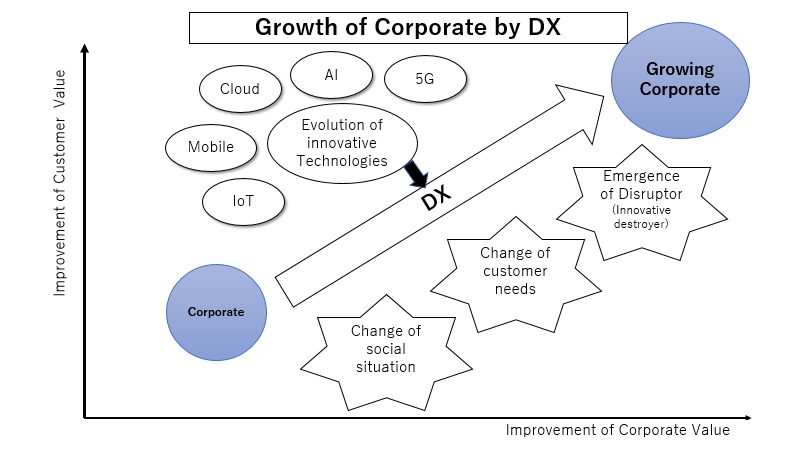Displaying present location in the site.
ICT Global Trend Part7-5
Promotion of DX in public administration(1/2)Digital Transformation, needed also for public administration
This article is written by Mr. K Tadashi Shikimori, Chief Fellow, Institute for International Socio-Economic Studies(NEC Group)
DX, what?,
DX(Digital Transformation or Digital Revolution )means the overall approach and challenge to transform current products , services, daily business practices, organization and business culture by digital technology and to create new business opportunities.
Currently there are a number of new on-going evolutions of innovative technologies such as AI (Artificial Intelligence), IoT (Internet of Things), Cloud System, advanced mobile, 5G (5th Generation Mobile), Blockchain (Distributed Ledger) and under this situation enterprises and companies in advanced nations are in need of coping with ever-changing social situation and customers needs and also of coping with changes of fundamental business model.
Enterprises and companies are requested to improve customer experiences and to create new value for customers and they are requested to find new business opportunities through such activities as employing digital technologies actively and continuously.
In their “DX Report” published last year the Ministry of Economy, Trade and Industry gave warning that Japan may suffer from annual economic loss of maximum 12 trillion yen after the year 2025 unless DX is properly adopted and progressed domestic in Japan.
They also organized DX Office with the purpose of promoting DX activities among industries and of subsidizing their activities to improve their business competitiveness.
In April this year the Ministry of Economy, Trade and Industry further progressed their policies by selecting in collaboration with Tokyo Stock Exchange 29 specific stock names among IT industries who are positively promoting DX in Japan and by appreciating their efforts.
DX in Private Industry
DX is so utilized and promoted in the private industry that digital technologies improve customer experience and create new value for customers, transform the commercial war of conventional business into “war by the service” and improve “ imagination and creative power to plan the service value which may not be realized only by human power” with competitive speed.
These aspects are essential to make decisive business differentiation.
A number of good business practices of DX are found in such cases as improvement of customer relations of operators in call centers and enhancement of “recommend” in EC (Electronic Commerce) site. Digital technologies are well prepared to give best answer in the matter of seconds based on the abundant data and information stored, and are contributing to the improvement of profits and of loyalty (personal affection and attachment to specific brand or service).
Good practices are also seen in such cases as in fault sign detection of manufacturing machines, in analysis and dealing of possible trouble and security problem in the business processing system, and in process automation with combination of AI and RPA (Robotic Process Automation).
In order to make the business differentiated substantially from others it is imperative that we should not only improve conventional business process and model but destructively transform them.
The good example of this destructive transformation is seen in the case of Uber where they realized the business differentiation not only by simple enhancement of individual service but by holistic enhancement in customer experience and convenience in mobility-as-a-service with combination of several different services such as dispatching of cars and fare adjustment.
The way how the business and service is offered, and, presented to customers and how they can enjoy the service will be changed, improved and enhanced by innovative digital technologies.
DX in Public Administration
DX has not yet been widely developed in public administrations.
Some advanced governments and local public administrations, however, have started to introduce DX to enhance the level of administration process and service and improve its efficiency under the situation where possible limitation of personnel and financial budget is expectedly increased although public administration issues are getting more and more complex and complicated.
In order to progress DX in public administrations there are a number of important issues to solve such as how the development of public service can be made to keep flexible, continuous and sustainable improvements, how the collaboration can be established with private companies and start-ups who have innovative technologies to create new services, how the public administration can be improved and enhanced by design thinking, how a high level of usability is secured, and how public service can be monetized.
